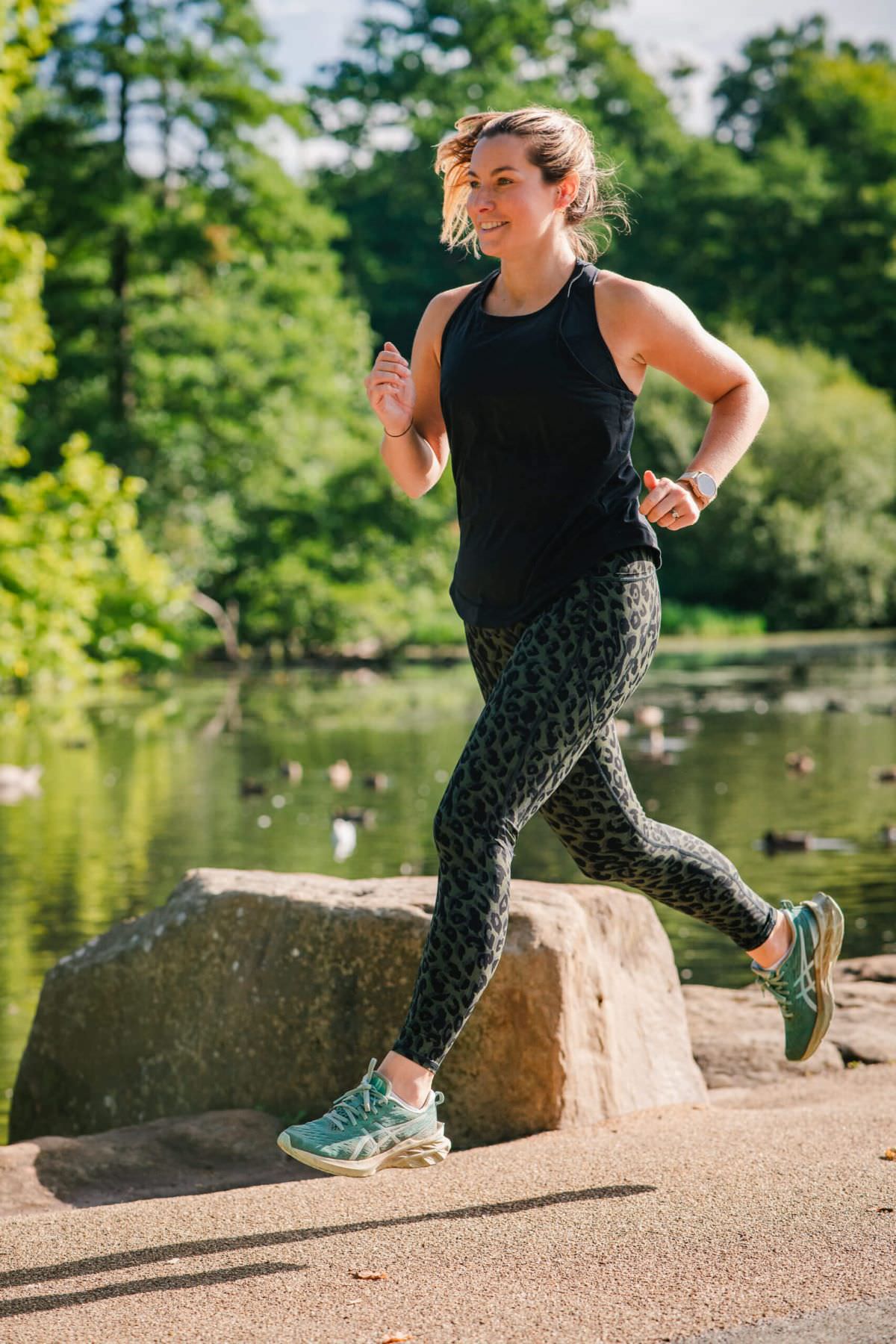
In the process of writing this, I have tested a LOT of gels, and will continue to add them to the list as I try other brands, flavours and products (it is not an exhaustive list…yet!). Next up, it’s chews and drinks, sign up to my email list to be the first to get nutrition tips and taste test updates!
When you’re running for more than 90 mins, whether that is on a training run or in a race, energy gels are one of the easiest ways of fueling during your long runs. Most gels are specifically designed to be high in carbohydrates, easily digestible and practical to carry and consume mid run.
After getting my pre and mid race nutrition quite wrong during Big Sur Marathon (I was starving!), I decided to really dial in to my on-the-run fueling this training cycle, and have been taste testing gels to find out what works for me as well as dramatically increasing my overall carb intake on my long runs.
The Best Energy Gels for Running
When to fuel?
5-10 mins before the start of the race then every 30 – 40 mins during! Use mins vs miles for your fueling plan.
Start early when your heart rate is low and you’re less likely to have stomach issues! Plus if you leave it until further into the race, then it might be too late…
How many gels do you need?
It’s more a case of carbs rather than gels. Without getting too complicated, if we mix carbohydrate sources then (with practice) our body can utilise up to 90g carbs per hour. Many specially formulated gels are designed to incorporate two or more carb sources to maximise their effectiveness.
Previously recommendations were that runners should consume 30-60g per hour, but now it is advised that with training, we should be aiming for 40-70g per hour… or more!
Most gels are between 20-25g carbs, however you can find options that pack as much as 40g carbs per gel.
Calculate the number of gels you need:
Your goal time in hours (eg 3.5 hours) x 40-70g = total carbs
Divide total carbs by number of grams of carb per gel = number of gels
So if you’re using Maurten 25g carb gels, you would need 7 gels during the race (one pre-race then every 30 mins). You can do the same for half marathons.
What else to think about?
- Electrolytes/sodium content of your gels and your sweat rate
- Whether you need to take water with your gel or not
- What fuel is on course at the race
- How to carry your fuel of choice
- Where the aid stations are on course
- Taste and texture!!
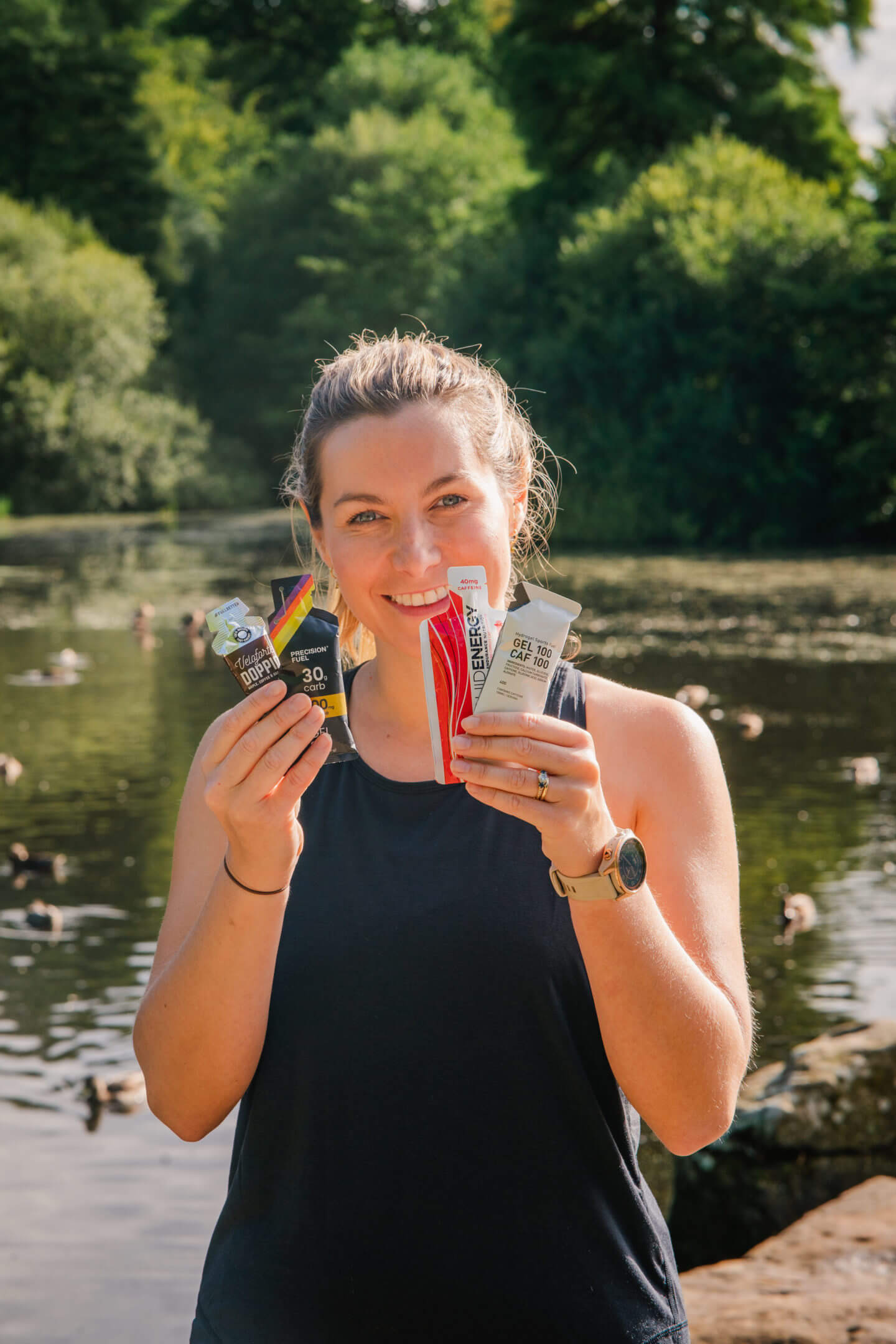
The Best Energy Gels for Running
I’ve included pricing from XMiles as I’ve found they have the widest range of running gels in the UK, and they do a good price structure where the more you buy, the lower the price per gel. Other gels not stocked were linked/price checked on their product websites. This post contains affiliate links – as always, I appreciate your support.
Not sure where to start? I bought an Energy Gel Selection Box from XMiles to taste a range of gel options (they also have a vegan only option) for £15 – a great present for the runner in your life. I also think the monthly subscription is a brilliant gift idea for £13.99 a month!
Best Isotonic Gels
Isotonic and hydrogels are pre-mixed with water and therefore don’t need to be taken with additional fluid – however you shouldn’t ignore your hydration requirements and should have water or sports drinks on the course.
Maurten Original
Technically not an isotonic gel but the first hydrogel. The technology enables carbohydrates to be smoothly absorbed through the stomach to your intestine .The texture is…weird. there isn’t another way to describe it. These gels have been made very popular by elite runners and IG’ers alike but I haven’t seen any of them talk about the consistency. It’s a gelatin like, thick jelly texture. Since trying it, I’ve been recommended to let it dissolve in the side of my cheek. One thing is for sure, given their wide usage among top runners…they work!
Carbs: 25g per 40g
Sodium: 50mg
Cost: £2.90
High 5 Energy Gel Aqua
The berry flavour reminds me of Strawberry Ribena, and that is a very good thing in my opinion. Unlike their traditional energy gels, these are a thinner consistency so don’t require water with them (although you will need extra electrolytes). I love their packet recycling programme with a pre-paid envelope included with purchase!
Carbs: 23g per 66g
Sodium: 27mg
Cost: £2.90
Best Real Food Gels
Natural gels are sometimes easier on the stomach however they often contain a lower carbohydrate content and more fibre, fat or protein than other energy gels which can slow down the absorption, and so you may want to start taking gels earlier in the race. Don’t forget to take with some fluid!
Huma
These have been my go-to gels for years, made with chia seeds as a base these are very easy on the stomach. I really like the Apple & cinnamon, Strawberry and Raspberry flavours.
Ingredients: fruit puree, cane sugar, brown rice syrup, powdered chia seeds, sea salt, citric acid
Carbs: 22g per 42g
Sodium: 105mg per 42g
Cost: £2.00
Spring Gels
With a rice syrup and fruit base, this vegan gel is a great natural option with a wide range of flavours. I tried the Punchy Plum Power Rush and although the slight sourness wasn’t to my taste, I did appreciate that the overall flavour wasn’t overwhelmingly sweet.
Ingredients:
Carbs: 20g per 45g
Sodium: 160mg
Cost: £3.55
Mule Bar
With a resealable lid, this natural gel would be a good option for those that like to slowly sip their gels over a mile or more. The taste was inoffensive, and these could be a good option for environmentally friendly runners as they offer refill bottles for your resealable tubes. Most are vegan, however the salted caramel contains skimmed milk powder.
Ingredients: Brown rice syrup, agave syrup, fruit juice, Himalayan pink salt
Carbs: 25-28g per 37g protein
Sodium: 27mg
Cost: £2.00
Veloforte
The Riba flavour was delicious, like Ribena, but it was very sweet and syrupy. Renee McGregor Veloforte’s Dietitian and ambassador suggested mixing them with water to make them easier to handle. I preferred the less sweet, earthy flavour of the Beetroot & Lemon. I found the packet quite difficult to open and consume on the run!
Ingredients: Brown rice syrup, fruit juice concentrate, maple syrup, water, elderflower extract, pink Himalayan salt.
Carbs: 22g per 33g
Sodium: 110mg
Cost: £1.99
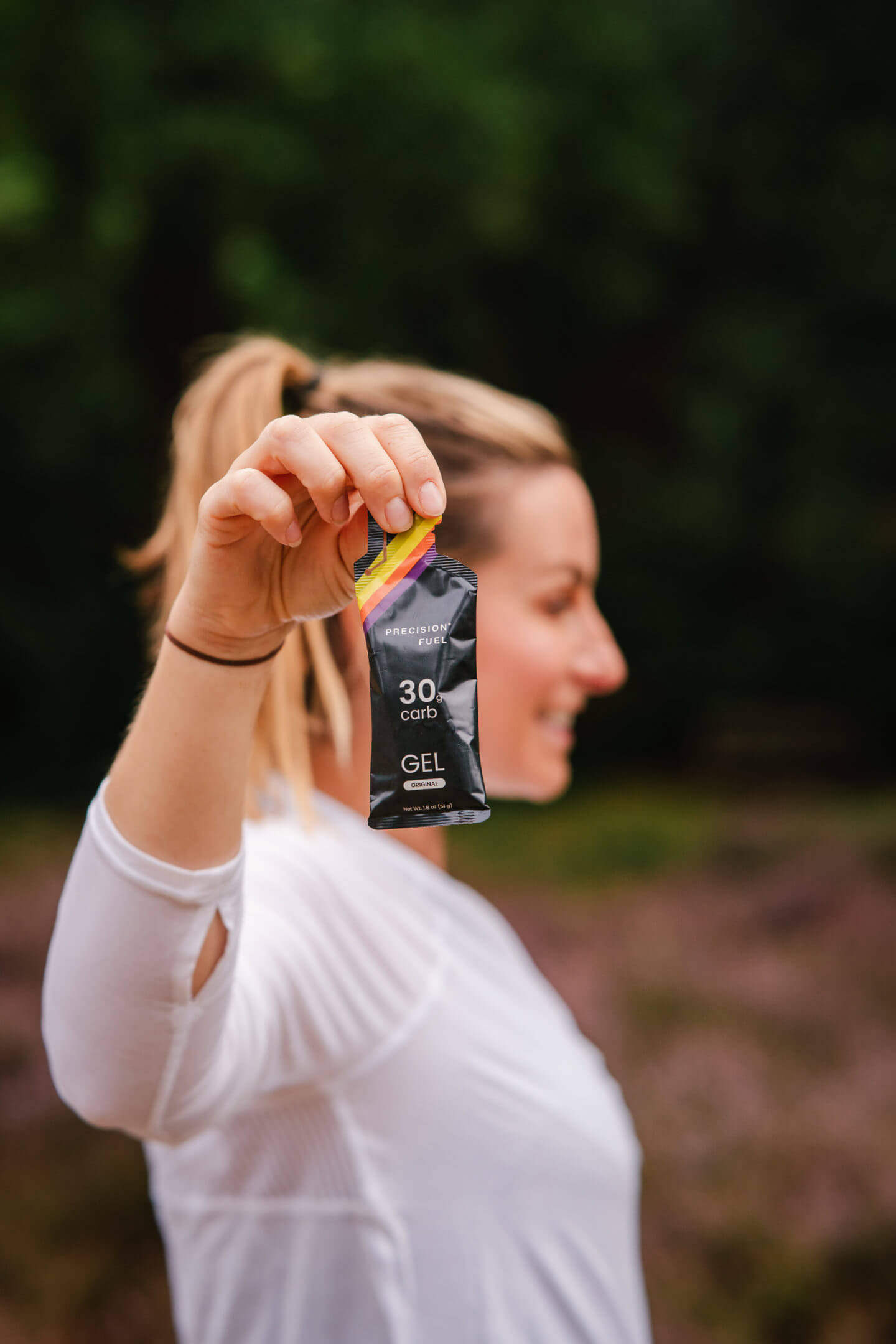
Best High Carb Gels
More carbs per gel, less gels you need during the race, and/or the bigger the fuel boost! These could be great options for those that struggle to carry things on the run, want to sip their gels rather than take all in one go, or that have issues with taking gels later in the race and want to front load the carbs!
Precision Fuel
So far this gel is my favourite new discovery. I really liked the neutral taste, small size, easy to open pack and puree thickness. I found it easy on the stomach and appreciated the higher carb content. However it is lacking in electrolytes so would need to be taken with a sodium rich drink or salt pill.
Carbs: 30g
Sodium: 0g
Cost: £2.25
OTE Super Gel
These higher carb gels are a great option for those that want to get more carb bang for their bucks. HIgher carb content means fewer gels, which means you can fuel less often and less spend! The texture is a thick syrup with a Ribena berry blackcurrant flavour (mixed in with Tixylix cough syrup – but not in a bad way!)
Carbs: 40g per 66g
Sodium: 11.6mg
Cost: £2.00
Best Higher Sodium Gels
Huma Plus
Very similar to the original Huma gels, but with 240mg sodium per 41g, plus added electrolytes from sea salt and coconut water. These chia based gels are easy on the stomach so perfect for those that struggle with artificial options, however it’s worth noting that they are higher in fibre and protein so are slower to be absorbed than others.
Carbs: 21g per 41g
Sodium: 240mg per 41g
Cost: £2.35
Unived
The salted lime flavour reminded me a little of a cheap frozen Margarita using fake lime flavouring. The liquid was thin and easy to quickly swallow. They’re one of the only gels I’ve seen to contain Beta-Alanine which is supposed to enhance performance by increasing exercise capacity and decreasing muscle fatigue – although excessive amounts can leave skin tingling. I love that the packaging is designed to minimise waste as the top stays attached when you ripped it off.
Carbs: 26g per 41g
Sodium: 131mg per 41g
Cost: £1.95
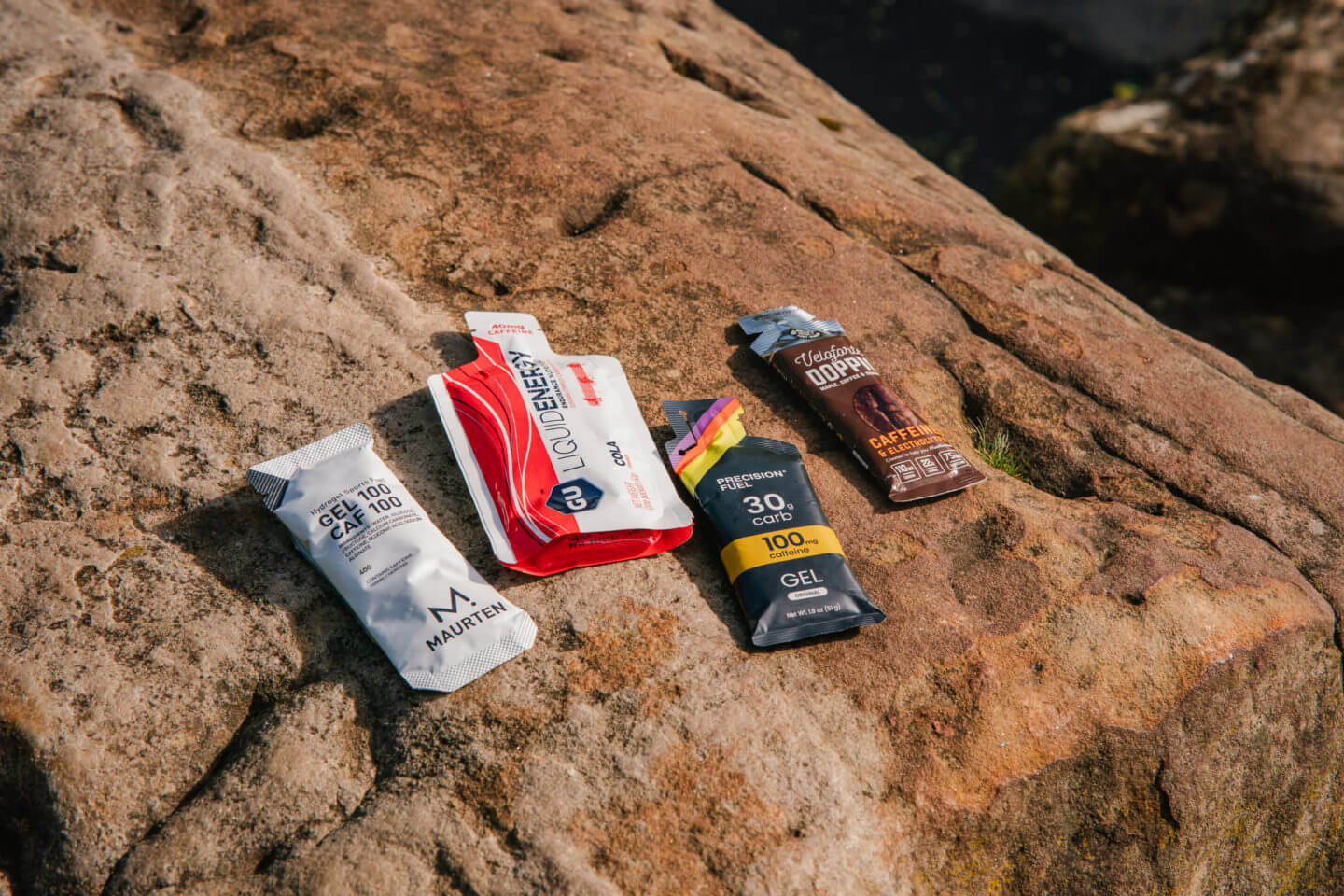
Best Caffeinated Gels
Caffeine helps boost mental toughness, reduces perceived effort and decreases perceived levels of pain. For those that can tolerate caffeinated gels, these can be a major boost during your race. You want to take them 45 minutes to 60 minutes before you want to feel the effects as caffeine typically takes this time to reach full strength in the blood stream.
You’re aiming for 3-5g per kg bodyweight during a marathon.
Precision Fuel Caffeinated
I was very pleasantly surprised that this didn’t have the same bitter taste that many other caffeinated gels have. It retains the same taste and texture as the caffeine free version, as well as it’s higher carb content. With 100mg caffeine per gel, most runners will only need 2 – 3 per race to get the caffeine boost.
Carbs: 30g per 51g
Sodium: 0g
Caffeine: 100mg per 51g
Cost: £2.95
Maurten Caffeine
If you saw my Reel, you’ll know I’m actually not exactly a fan of these bitter gels – however many people LOVE them which is why I’ve included them here – and they were better the second time I tried them…just! I think it’s probably easier to tolerate once you’re using to the strange texture of Maurten and I definitely think I benefitted from the caffeine later on in my run. You ideally want to take your caffeinated gels 60 mins before you want it to kick in – around 20/30 mins before the end of your race!
Carbs: 25g per 40g
Sodium: 138.5mg per 40g
Caffeine: 100mg per 40g
Cost: £3.50
Gu Energy Gels
There are caffeinated and non-caffeinated options from Gu with a wide variety of flavours. I used Salted Caramel Gu’s in a number of marathons but recently tried Cola as a caffeinated option – compared to other caffeinated gels, it’s caffeine content is quite low (less than half that in a Maurten or Torq). The gels are very thick and sticky but I do love how small the packs are. For those that prefer a thinner consistency, you might prefer the Gu Liquid Energy Gels (I tried the coffee flavour and liked the slightly syrupy taste/texture)
Carbs: 22g carbs in 32g
Sodium: 60mg
Caffeine: 40mg
Cost: £2.00
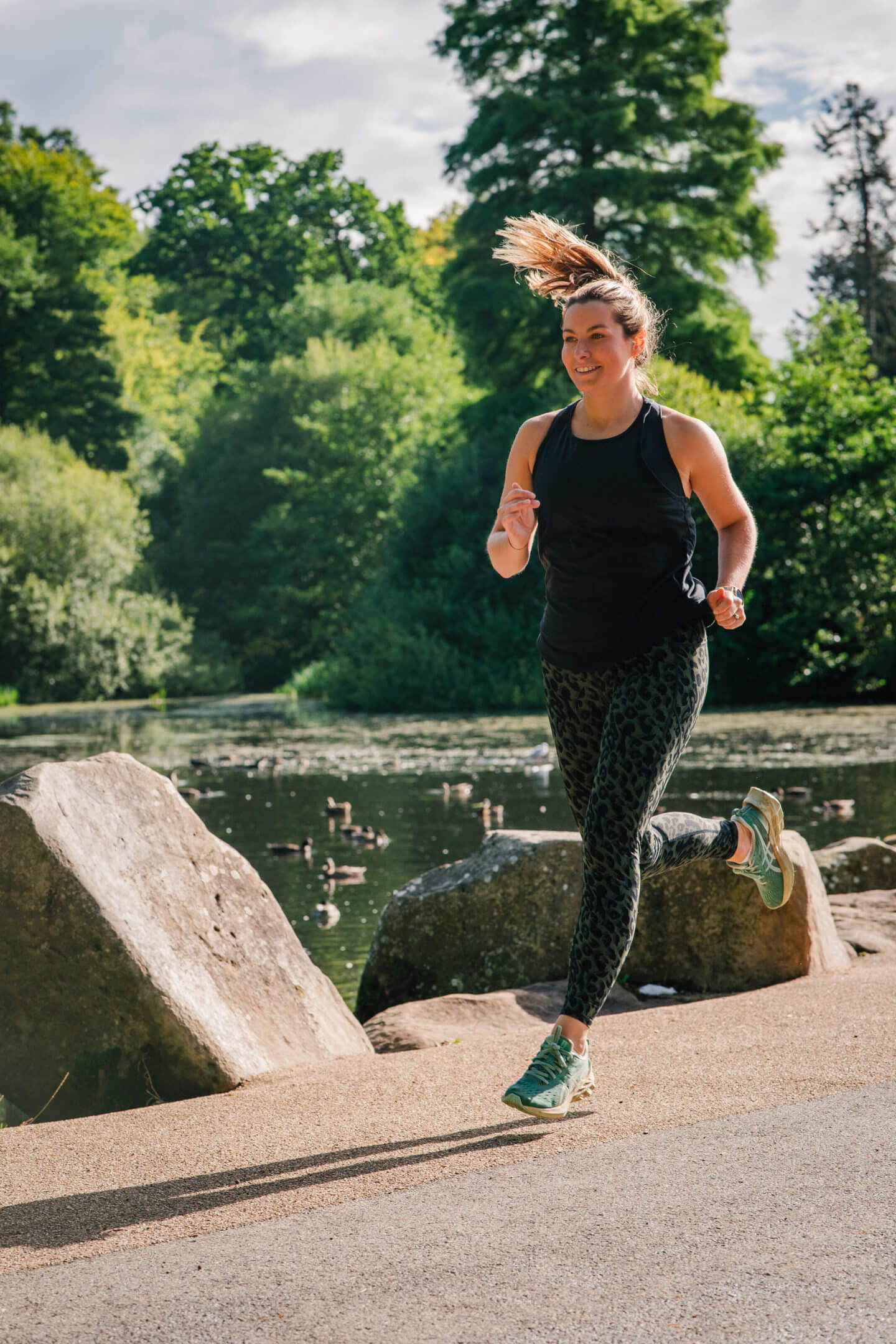
Best Cheaper Options
Whilst I’m not including Jelly Babies, Haribo and Wine Gums – these are great options for cheap running fuel. I’ve included gels that are under £2 per gel, and often even cheaper when bought in bulk!
OTE Energy Gels
The apple version tasted just like apple concentrate, and with a very thin consistency makes it easy to drink on the go or dilute in water. They even have two options when tearing open; gulp or sip!
Carbs: 20.5g per 56g
Sodium: 30mg
Cost: £1.75
High 5 Gels
A great option that is widely available at sports shops and races, the thinner consistency gels are easy to consume and although sweet, are not as sickly as many others. Designed to be taken with electrolytes.
Carbs: 23g per 40g
Sodium: 19mg
Cost: 95p
Kendal Mint Co
I remember my friend Anna giving me a bar of Kendall Mint Cake on my Duke of Edinburgh expedition and it felt like life-giving nectar. Maybe this Citrus & Mint gel would do the same given at the end of the race? The thin textured gel is certainly minty, infact it uses peppermint extract to help promote natural digestion. I didn’t mind it, but found it a little toothpasty. The refreshing taste would make a nice change towards the end of a race but I’m not sure I could use it as my only gel flavour. There is also a caffeine option.
Carbs: 27g per 70g
Sodium: 120mg
Cost: £1.50
NOT FOR ME…
VALA
I really liked the taste of this natural gel, it reminded me of some of my fave smoothies. It was quite thick and definitely needed to be taken with ample water. Dates are a great source of potassium, however they are also high in fibre, which could cause digestive issues for the untrained gut (they did for me which is why it’s in the ‘not for me’!).
Ingredients: maple syrup, date paste, lemon juice, lime juice, powdered chia seeds, matcha tea powder and sea salt.
Carbs: 23.8g per 35g
Sodium: 50mg
Cost: £2.49
SIS Gels
These gels seem to be like marmite, you either love or hate them. I wasn’t a fan but I know lots of runners find these easy to take and tolerate during their races. One benefit to these gels is that they are very widely available and come in a range of flavours. They’re low in sodium so would benefit to be taken with an electrolyte drink and/or salt pill for salty sweaters!
Carbs: 22g per 60ml
Sodium: 4mg
Cost: £1.70
Hammer Gel
I tried the apple & cinnamon, and quite honestly, couldn’t taste the apple. Worse than the flavour was the glue-like texture and very thick consistency. Not one I’ll be trying again.
Carbs: 22g per 33g
Sodium: 25mg
Cost: £1.85
STYRKR
I felt like this should have been good with a thin consistency, 30g carbs and no-need for water…however the taste was very synthetic, like cough mixture (and not in a good way). I really struggled to finish this gel – and have heard that the caffeinated version is even worse.
Carbs: 30g per 72g
Sodium: 0mg
Cost: £2.50
UCAN
I was surprised by how sharp the taste was of the strawberry banana flavour was. These gels unlike most others, aren’t designed to give you a sugar spike, instead using their patented SuperStarch, that is engineered to do the exact opposite. I took this pre-run hoping it would be a constant energy boost, but found it took about 60 mins to get into the groove on that run. I have heard that many prefer the bars and powders vs gels from UCAN – but for the price, its not going to be part of my regular fueling plan.
Carbs: 15g superstarch
Sodium:
Cost: £3.40
My Favourite…
My current favourite is the Precision & Hydration Gel and Caffeinated gel!
Which gels do you use? Have you tried any of the above?
This is so informative and interesting. xx